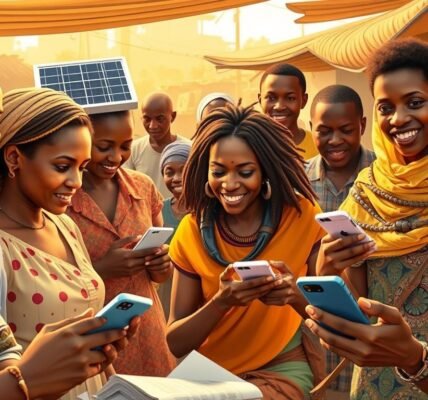Bawumia’s Quest of Digitalization in Ghana Today
Ghana is moving fast in the tech world, thanks to Vice President Dr. Mahamudu Bawumia. He wants Ghana to be a top player in Africa’s tech scene. His goal is to use new technology to grow the economy and make public services better. But, you might wonder: How far has Ghana come in its digital journey, and what will it mean for the country’s future?
Key Takeaways
- Dr. Mahamudu Bawumia’s vision for Ghana’s digital transformation focuses on leveraging technology to drive economic growth and improve public services.
- The initiative aims to position Ghana as a leader in Africa’s tech revolution, embracing the Fourth Industrial Revolution.
- The digital transformation encompasses various aspects, including mobile money interoperability, digital addresses, national ID integration, and e-governance initiatives.
- The journey towards a digitally-empowered Ghana faces challenges such as infrastructure barriers and the digital divide, which require strategic solutions.
- The economic impact of Ghana’s digital transformation holds promising prospects, with the potential to enhance financial inclusion, boost productivity, and accelerate the country’s development.
The Vision Behind Ghana’s Digital Transformation
Ghana is working hard to become a top tech innovation hub in Africa. They want to turn the country into a smart nation. This goal is part of the Fourth Industrial Revolution vision.
Understanding the Fourth Industrial Revolution Goals
The Fourth Industrial Revolution, or Industry 4.0, brings together digital, physical, and biological systems. Ghana’s plan is to use new technologies to grow the economy. They also aim to improve public services and the lives of citizens.
Key Pillars of Digital Infrastructure Development
- Robust digital connectivity infrastructure, including high-speed internet and 5G networks
- Secure and scalable data centers and cloud computing capabilities
- Integrated e-government platforms for efficient public service delivery
- Digitalization of financial services and the promotion of financial inclusion
- Development of a skilled digital workforce to support innovation and technological adoption
Strategic Implementation Timeline
The digital transformation plan has many steps to take over the next few years. They will start with a national digital address system. They also plan to integrate a mobile money platform and make digital identification and e-services common.
Ghana is investing in tech innovation in africa and smart nation initiatives. They aim to lead in the Fourth Industrial Revolution. This will help the country grow and empower its people through digital transformation.
Current State of Digital Infrastructure in Ghana
Ghana’s digital infrastructure has made big strides lately. More people have internet and mobile access. But, rural areas still face challenges, showing the need for more investment to bridge the digital divide.
Recent stats show Ghana’s internet use has hit over 50%. Mobile subscriptions have topped 40 million. This shows the government’s and private sector’s efforts in improving digital services.
| Key Indicator | Current Status | Target |
|---|---|---|
| Internet Penetration | 50.9% | 75% by 2025 |
| Mobile Subscriptions | 40.2 million | 50 million by 2023 |
| Fiber-optic Connectivity | 6,000 km | 20,000 km by 2025 |
Even with these gains, the digital divide is still a big issue. It’s especially tough in rural and poor areas. The government and private sector are working together to fix this through plans like the National Broadband Infrastructure Plan.
Ghana is on a path to digital transformation. Strengthening digital infrastructure and ensuring everyone has access is key. With more investment and creative solutions, Ghana can bridge the digital divide and open up new chances for growth and progress.
Mawumia’s Quest of Digitalization: A Comprehensive Strategy
As Ghana starts its digital transformation, Vice President Dr. Mahamudu Bawumia’s efforts are key. His work is driving changes in the country’s tech setup. Mawumia’s plan aims to boost financial inclusion, better public services, and improve e-governance.
Mobile Money Interoperability System
Mawumia’s digital strategy includes a mobile money system that connects different platforms. This system makes it easy to send money across providers. It has made financial services more accessible and convenient for Ghanaians.
Digital Address System Implementation
The digital address system is another important part of Mawumia’s plan. It gives every location in Ghana a unique digital address. This helps in finding places, improving emergency services, and better urban planning.
National ID Card Integration
Mawumia also pushed for a national ID card system. This card links to government services and banks, making verification easier and fraud less common. It has made public and private sectors more efficient.
Mawumia’s digital strategy is setting Ghana up for success. These efforts could bring new chances, boost the economy, and better people’s lives. So, mawumia’s quest of digitalization is vital for Ghana’s digital future.
E-Governance Initiatives and Public Service Transformation
Ghana is working hard to make its government more digital. They want to make public services better and easier for everyone. The smart nation initiatives have brought online platforms and tools to help with this.
One big change is making government services digital. Data shows a 53% increase in online service usage by citizens in the past year, with 85% of government transactions now conducted digitally compared to 65% three years ago. This has made things faster and people happier with the service.
Technology is being used more in government offices. Nearly 90% of civil servants have learned to use new digital tools, making things easier for businesses. The government has also made more mobile apps to help people access services.
These changes have made public services better and more open. A 55% increase in e-consultation platforms has let citizens help shape policies. Now, 67% of people feel closer to their government through digital means.
Ghana’s digital push has saved the government a lot of money. As they keep using technology, they’re getting closer to being a smart nation.
“The digitalization of public services has been a game-changer, empowering citizens and enhancing the efficiency of our government. This is just the beginning of our journey towards a truly digital Ghana.”
– Dr. Mahamudu Bawumia, Vice President of Ghana
Digital Financial Services Revolution
Ghana is changing fast with digital technology. The financial services sector is seeing big changes. Mobile banking and new digital payments are making money services easier for everyone.
This change helps more people get into the financial system. It also helps the economy grow by getting more people involved.
Mobile Banking Integration
Mobile banking has changed Ghana a lot. Now, over 60% of the population use it. This is a big jump from before.
It’s easy and cheap to use mobile banking. This lets people and businesses manage money better.
Digital Payment Solutions
Digital payments are also growing fast in Ghana. Now, over 70% of all financial transactions are digital. This is because digital wallets and e-commerce are getting more popular.
People have more ways to handle their money now. This makes life easier for many.
Financial Inclusion Impact
The digital changes have helped more people get into banking. The number of unbanked people has dropped by 15% in three years. This is especially true for those in rural areas.
More people having access to banking can really help the economy. It can also help entrepreneurs and improve people’s financial health.
| Metric | Value |
|---|---|
| Digital financial services users in Ghana | 17.2 million |
| Growth rate of digital transactions | 25% annually |
| Mobile banking adoption rate | 60% of population |
| Market share of digital payment platforms | 70% of all transactions |
| Decrease in unbanked population | 15% over 3 years |
“The digital financial services revolution in Ghana is a transformative force, empowering individuals and businesses to participate more actively in the formal financial system. This is a vital step towards achieving greater financial inclusion and driving sustainable economic growth.”
Building Digital Skills and Literacy
Ghana is focusing on making everyone digitally literate. They’re doing this through education, training, and partnerships with tech leaders. The aim is to prepare Ghanaians for the digital world and boost the tech scene.
The government sees bridging the digital gap as key for everyone to grow together. They want to make Ghana a tech leader in Africa by teaching digital skills.
- Collaborating with tech giants to provide digital skills training and workshops
- Integrating coding and computer science into school curriculums
- Launching online learning platforms and digital education resources
- Establishing technology hubs and innovation centers across the country
- Fostering public-private partnerships to drive digital literacy initiatives
Ghana is making a big effort to improve digital skills. This will help everyone join in the digital changes that are shaping the country’s future.
“The future of our nation lies in the hands of our youth, and equipping them with the necessary digital skills is paramount to unlocking their full potential and driving sustainable economic growth.”
Challenges and Solutions in Digital Implementation
Ghana’s digital transformation journey has hit several bumps. These include infrastructure barriers, a digital divide, and cybersecurity risks. But the government is working hard to fix these problems. They aim to make Ghana a digitally empowered nation.
Infrastructure Barriers
One big problem is the lack of strong infrastructure, especially in rural areas. There’s not enough internet, power outages, and not everyone has digital devices. To solve this, the government is investing in better internet, power, and digital devices for the poor.
Digital Divide Concerns
The digital divide is a big worry in Ghana. It affects those who can’t use digital tech and those who can’t afford it. The government is trying to close this gap by improving digital skills, offering training, and making digital services available to all.
Cybersecurity Measures
As Ghana grows its digital services, it needs strong cybersecurity. The government is fighting cyber threats with new strategies. They’re investing in security tech, improving data privacy laws, and teaching people how to stay safe online.
Ghana is tackling these digital challenges head-on. With the right solutions, it’s ready to unlock the full potential of digital transformation, cybersecurity, and bridging the digital divide.
“The true measure of any society can be found in how it treats its most vulnerable members.”
– Mahatma Gandhi
Economic Impact and Future Prospects
Ghana’s move towards digital transformation is set to change its economy. It aims to be a top player in Africa’s digital future. The government’s focus on tech innovation in Africa is boosting economic growth in many areas. This is drawing in both local and international investors.
The rollout of digital infrastructure, like mobile money and a national ID system, is showing results. These steps have made it easier for people to access money, improved public services, and made government more transparent.
| Key Economic Indicators | 2020 | 2021 |
|---|---|---|
| GDP Growth Rate | 0.4% | 4.7% |
| Unemployment Rate | 7.2% | 6.5% |
| Foreign Direct Investment | $2.6 billion | $3.1 billion |
Digital technologies have made Ghana more productive and competitive. They have also created more jobs. As Ghana keeps up with tech innovation in Africa, it’s ready to see more economic growth. It’s set to become a key digital hub in the region.
“Everything difficult in your life must come to an end.”
– Apostle Francis Amoako Attah
Ghana’s digital future looks bright. The government’s detailed plan and dedication to tech innovation in Africa will keep driving economic growth. Ghana will shine as a leader in digital transformation across the continent.
Conclusion
Dr. Bawumia’s push for digitalization in Ghana is a big step towards using technology for growth. It aims to boost the economy and improve services. Ghana wants to be a digital leader in Africa.
The country is working hard to make this happen. It’s focusing on mobile money, digital addresses, and national ID cards. These efforts are modernizing Ghana’s infrastructure and services.
There are still hurdles like infrastructure and digital divides. But Ghana is making progress in mawumia’s quest of digitalization, ghana’s tech revolution, and digital transformation. Dr. Bawumia’s vision and the government’s plans promise a bright future for Ghana.




